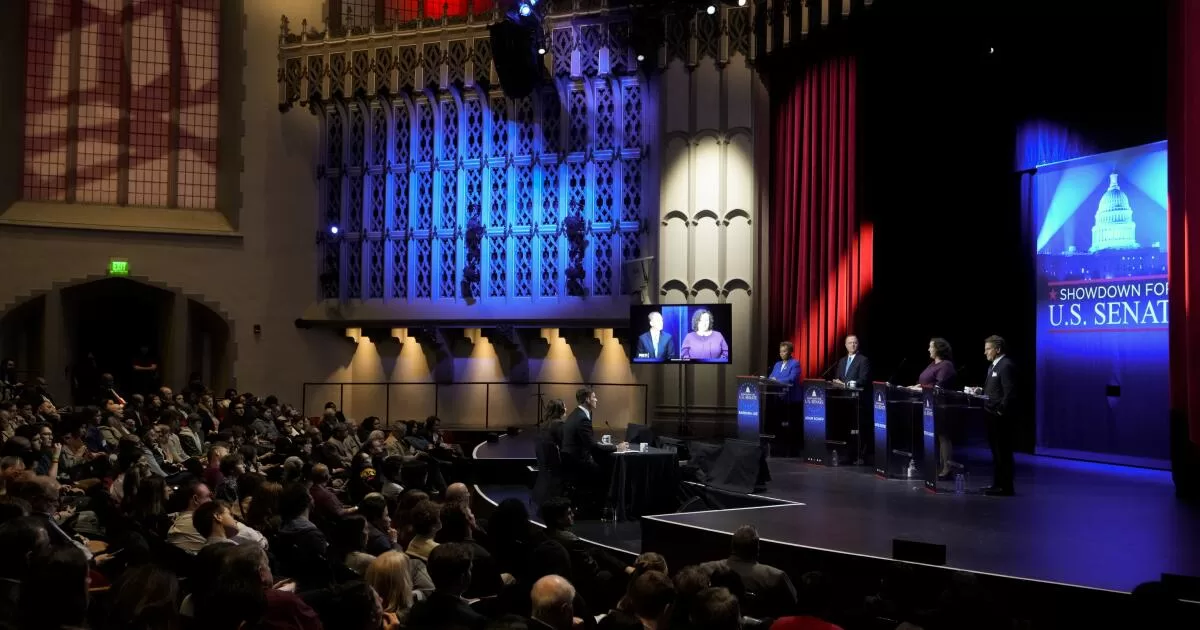That was the challenge facing three Democrats who took the stage for the first statewide televised debate of California’s highly competitive, vastly expensive U.S. Senate contest.
The answer: Seize on those relatively few differences and emphasize them loudly and repeatedly. Add a strong overlay of anecdote and personal narrative. Throw an occasional elbow, for good measure.
If you’ve closely followed the Senate race, you would have easily recognized the Democratic contestants who assembled Monday night on a red, white and blue sound stage on the campus of USC.
If you haven’t, it didn’t take long to get their gist.
A deliberate Rep. Adam Schiff told how he personally took on former President Trump as a leading congressional tormentor and is a doer, not just a talker.
A passionate Rep. Barbara Lee offered her history as a progressive with a long history in Sacramento and Washington and the lived experience of a single Black mother who was once homeless and raised her children with the help of food stamps.
A vociferous Rep. Katie Porter pressed her case as a scourge of corporate interests who wants to shake up Washington and is not one of those promise-much, achieve-little career politicians. (Like Schiff and Lee, she averred, each with more than 20 years in Congress. Porter was elected in 2018.)
Standing out wasn’t difficult for the lone Republican among them, Steve Garvey, the former baseball great and (it was abundantly clear) a political novice.
Garvey would be irrelevant in the Senate race but for the state’s election system, in which the two top finishers in the March 5 primary advance to November’s general election, regardless of party. That makes the jostling for second place nearly as important as the fight for the top spot.
Garvey has little to no chance of winning the Senate seat, given the enfeebled state of the GOP in California and its poor image among the state’s Democratic-leaning electorate. But by consolidating Republican support — the party has 5 million-plus registered voters in California, more than the population of many states — Garvey could easily reach November’s runoff.
His appearance Monday night was a political debut of sorts, and a shaky one at that.
Garvey is caught in a dilemma, trying to appease the Trump-loving Republican base without alienating the far greater number of Californians who loathe the ex-president. Even the most nimble politician would have a hard time managing that feat, and Garvey proved himself anything but.
He voted twice for Trump and, after being repeatedly pressed Monday night for an answer, strongly intimated he would do so again. Garvey, however, refused to directly say as much, instead offering this: “At the end of the day, it’s all a personal choice. As my personal choice, I will make it in the sovereignty of wherever it is and that’s my personal choice.”
He also stumbled when asked about the abortion issue. Although Garvey personally opposes the procedure, he said he would support reproductive rights as a U.S. senator. “The people of California have spoken and I pledge to support that voice,” he said.
The debate co-moderator, Politico’s Melanie Mason, then followed up by asking whether Garvey would similarly abide by the will of most Californians who strongly support stricter gun laws and oppose Trump’s return to office.
More word salad.
“Well I have my opinions, obviously,” Garvey said. “And with common sense and compassion and ability of consensus. You know, I look at all the issue. I think I’m fair.”
Throughout the night, Garvey was vague on most issues and just plain confusing on others. At one point he suggested the solution to California’s housing affordability crisis was cutting excessive Washington spending and opening up “the pipes of gas and oil” to reduce energy costs.
Will the performance cost Garvey with voters? That’s not clear.
He displayed an affable, aw-shucks style reminiscent of the political hero he name-checked, Ronald Reagan, who easily survived his share of gaffes by delivering them in a similarly soothing, avuncular style.
Will earmarks decide the Senate contest?
It was one of the main points of contention among the Democrats, with Porter forswearing the practice — in which lawmakers direct federal funding to specific, often pet projects — and Lee and Schiff both defending the process.
“Earmarks,” Porter insisted, “is just a fancy word for politicians substituting their personal interest … for what our needs are.”
“I believe in earmarks,” Lee said. “I believe in not being derelict in my duty.”
Will the war between Hamas and Israel prove decisive? (Elections are rarely decided on foreign policy.)
Lee’s early call for a cease-fire in Gaza set her apart from both Schiff and Porter, and she reiterated that Monday night. “The only way to keep Israel secure is through a permanent cease-fire,” Lee said.
Schiff disagreed. Hamas is “still holding over 100 hostages, including Americans. I don’t know how you can ask any nation to cease fire when their people are being held by a terrorist organization.”
“Cease-fire is not a magic word,” Porter said. “You can’t say it and make it so.”
Listen closely, and there were other differences.
Lee and Porter both favored a system of government-run, universal healthcare. Schiff said he favored “Medicare for all,” but allowing those who preferred their private healthcare to keep it.
The debate was the first of three scheduled televised sessions.
Maybe the next two will do more to establish some yawning differences among the leading Democrats. Otherwise, the Senate contest seems likely to be decided more on matters of style than substance.
And, this being California, which candidate has the needed bankroll to reach the millions of voters who won’t pay attention to any of their debates.
